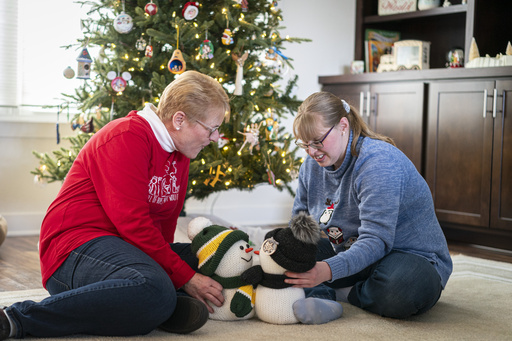
The Rev. Shannon Blosser recognizes his son’s enthusiasm for church activities, like music, singing, and communion. However, as a United Methodist pastor, he shares that his family has not always felt that 11-year-old Noah, who is autistic, has been fully welcomed within the church community. At one point, the family decided to stop attending services at a church where he worked, stating, “If we felt more supported, we probably would have pushed through.”
In light of this experience, advocates, families, and individuals with disabilities are urging religious communities to adopt more inclusive practices for those with intellectual and developmental disabilities, not just during the holiday season but throughout the entire year. Blosser emphasizes the need for congregations to recognize the “image of God” in everyone, regardless of their abilities. Now serving two supportive congregations in West Virginia, Blosser highlights efforts being made, such as Mount Olivet United Methodist Church’s “Calm Christmas” event. This gathering is tailored to be sensory-friendly, featuring music from a guitar instead of a piano and glow sticks in place of candles, along with fidget toys and visual schedules to help attendees navigate the service.
Blosser’s encouraging message to participants is to embrace their true selves. He believes families who may feel overwhelmed by traditional Christmas celebrations should feel free to relax and be themselves, allowing for a meaningful experience of God’s love. He aspires to make this kind of service a regular occurrence, potentially on a quarterly or monthly basis.
Linda Bunk, who identifies as having Asperger’s syndrome, emphasizes the importance of not only making churches accessible but also fostering an environment of belonging. She suggests that individuals with disabilities should be invited to serve in various capacities within the church, such as participating in the welcome team or sharing their musical talents. Bunk argues that by not engaging their skills, communities miss out on the full extent of what these individuals can contribute.
Bunk, who also lives with bipolar disorder, expresses her desire to see people with disabilities join the full congregation rather than being segregated. This kind of integration, she believes, would help dismantle misconceptions about disabilities. Blosser concurs, stating that the input of those with disabilities is crucial to planning for greater inclusion within church environments, encouraging congregations to adhere to the Golden Rule of compassion and understanding.
In New Jersey, Congregation Rinat Yisrael is organizing an inclusive Hanukkah service to be held soon. This event will feature Dov Marcus, a congregant with autism, who will have the honor of reciting blessings over the Torah. Stephen Glicksman, a synagogue member, describes this not as a one-time opportunity for Marcus, but as a chance for him to be recognized as a regular participant capable of fulfilling this role, showcasing his abilities to the congregation.
The planned service aims to create a welcoming and approachable atmosphere for all attendees, where they can engage in prayer and community in a sensory-conscious environment. Glicksman shares that despite Marcus rarely speaking outside of his home, he actively participates in synagogue activities, often smiling and engaging with the music.
As Marcus himself notes, being called to recite blessings brings him closer to God. Despite the challenges faced due to his sensitivity to sound, his connection to Judaism has remained strong, with treasured moments spent in prayer alongside family. His mother recalls the emotional response during his Bar Mitzvah when he successfully recited blessings, lighting up the room and creating joy for those present.
David Mandell, a psychiatry professor, encourages religious leaders to ensure that their places of worship are welcoming from the moment congregants arrive. He believes that true inclusivity should extend beyond events, and it involves creating an environment where all feel at home. Simple measures, such as training greeters and offering sensory-friendly spaces, can make a significant impact on families who may otherwise hesitate to attend services.
Similarly, Kathleen Krueger shares her experience of navigating church with her daughter, who has cognitive disabilities and autism, noting the challenges faced during their time there. Recognizing that other families faced similar experiences, she started a special needs ministry at Mt. Zion Lutheran Church, now part of New Life Lutheran Church, focusing on creating joyful and inclusive experiences during holidays and other events.
The ministry has recently celebrated its 20th anniversary with festive activities designed to foster love and acceptance within the church community. Krueger emphasizes the value of open communication, encouraging faith leaders to reach out and ask families how best to support individuals with disabilities. She advocates for cultivating a friendly and welcoming atmosphere to help everyone feel included and appreciated.

